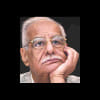Reluctance to shame British
I am disappointed with my countrymen. The 69th anniversary of independence was celebrated with the usual enthusiasm. The national flags were hoisted even in private homes. But there was no mention of the atrocities the British committed during their 200-year-long rule. Nor did I find any recall of Jallianwalla Bagh where the British-led soldiers killed hundreds of peaceful protestors after sealing all the exits of the Bagh.
I can understand that one should not carry rancour, but not to remind the British of their calculated brutality which even the Portuguese and the French did not commit in their possessions in Southern Africa or, for that matter, in India, begs the imagination.
Till today, history taught in Indian schools avoids the instances of British zulum. True, we should not dwell on the atrocities, but let not our children get the idea that the British regime was all goody-goody. London was like any other colonial power which suppressed the natives if and when they showed defiance.
Teachers should tell their classes that the weaving of famous Indian textiles was stopped to ensure that the British Lancashire textile mills flourished. This was exploitation, not free trade. Even worse was what happened in East Bengal where workers engaged in producing fine muslin had their hands chopped off.
Hardly surprising that so many revolutionaries later emerged from that part of Bengal. The brutalities committed against them are rarely told. Instead, we have British historians like John Keya who run down former minister Shashi Tharoor because he spoke the truth during a speech at the Oxford University Union.
He commented, "India's share of the world economy when Britain arrived on its shores was 23 per cent, but by the time the British left it was down to the four per cent. Why? It was simply because India had been governed for the benefit of Britain. Britain's rise for 200 years was financed by its depredations in India. In fact, Britain's industrial revolution was actually premised upon the de-industrialization of India." Unfortunately, Congress president Sonia Gandhi pulled him up for attacking the British so fiercely.
What Tharoor said was the outpouring of how the average Indian feels. He really gave a voice to the millions of voiceless. The problem with British historians or, for that matter, the British people, is that they did not feel they had committed anything wrong. They still live in that blissful ignorance and go on patting themselves on the back about how they united the different parts of India and created the world's most benevolent empire.
No less a leader than Churchill had this to say about India and Indians: "India is merely a geographical expression. It is no more a single country than the equator. Power will go to the hands of rascals, rogues and freebooters. All Indian leaders will be of low calibre and men of straw. They will have sweet tongues and silly hearts. They will fight amongst themselves for power and India will be lost in political squabbles. A day would come when even air and water would be taxed."
The fact is that we are a soft state and do not hit back to highlight the atrocities committed by the British. One possible exception was Netaji Subhash Chandra Bose who was schooled in a different way of thinking. His Old Testament idea of an eye for an eye and a tooth for a tooth lay behind in establishment of the German and Japanese-backed Indian National Army (INA).
But Netaji was not liked by Mahatma Gandhi who led the national movement. True, his methods did not fit into Gandhi's non-violence, yet Netaji was so popular that Gandhi kept him away from the Congress lest he should lead the party. He ultimately had to leave the country but unfortunately trusted the forces like the Japanese and the Germans. There is no doubt that he presented an alternative to Gandhi's methods. But the latter understood India better.
Gandhiji could foresee that violence against the mighty British would not take the country anywhere. Through the sufferings and sacrifices he could arouse the conscience of the British people and the world all over so that they would see how brutal the colonial power was. There is no doubt that he succeeded despite Churchill's contempt in describing the father of the nation as "a seditious Middle-Temple lawyer, now posing as a fakir of a type well-known in the East, striding half-naked up the steps of the Vice-regal palace... to parley on equal terms with the representative of the King-Emperor."
To this day the British insist that the three and a half million strong Indian army was a volunteer army. At best they were mercenaries who would have fought for anyone who paid them, whether it was the British, the Maharajas or the Nawabs. London used them mercilessly as cannon fodder in both world wars. When the Germans in the First World War released poison gas against the British lines, it was Indian soldiers who bore the brunt, not voluntarily but because they were pushed.
I wish that the Commonwealth War Graves Commission would bring out these Indian sacrifices and not project the two world wars as fought only or largely by white troops. The deaths of Indians are as shocking as the demise of any white soldier. They too have mothers, fathers, sisters and brothers.
In Shakespeare's Merchant of Venice, Shylock is quoted as saying: "If you prick us, do we not bleed? If you tickle us, do we not laugh?" The Indians were never taken into consideration by the insensitive British rulers. EOM
The writer is an eminent Indian journalist.

 For all latest news, follow The Daily Star's Google News channel.
For all latest news, follow The Daily Star's Google News channel. 



Comments